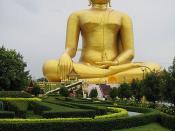Buddhism was brought to China in the 1st century C.E. as the religion of merchants from Central Asia. During this period of near-constant political and military strife, Buddhism found a receptive audience in China, while the influence of Confucianism waned. Buddhism was considered the first universal religion; it embraced all people, regardless of their ethnicity or social status. The Buddhist monastic establishment grew rapidly in China. It was a very difficult step for a man to become a monk: he had to give up his last name and take a vow of celibacy, breaking from the ancestral cult that connected the dead, the living, and the unborn. Buddhists who did not become monks or nuns often made generous contributions to the construction or beautification of temples. Although being a woman was considered inferior and temporary because it was supposed that the sex was alternative: once a man, once a woman; they could turn to Buddhism as readily as men.
A lot of people in China had positive responses at Buddhism, while others had negative responses. People that are pro-Buddhism would say that Buddhism makes a society perfect and that the Nirvana is an absolutely true factor of our lives. In the other hand people who are anti-Buddhism agree that Buddhism destroys the Chinese traditions and that the Nirvana status doesn't exist. As you can predict after reading this brief introduction on Buddhism, this essay will analyze the responses to the spread of Buddhism in China. The responses to the spread of Buddhism in China were mainly positive for many reasons. One of the most important reasons why people reacted so positively to the spread of Buddhism in China is for the Nirvana status. Buddhism believes in a continuous cycle of death and rebirth and that each person's position and...


